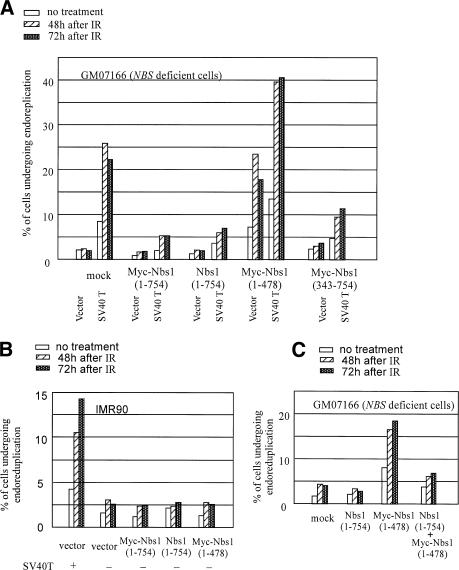Figure 5.
Ectopic Nbs1 expression suppresses T-mediated endoreduplication. Each experiment was repeated at least three times with similar results, and the results of a representative experiment are shown in each case. (A) The NBS-deficient cell line, GM07166, immortalized by expression of hTERT, was infected with retroviruses encoding wild-type Nbs1 (Nbs1), myc-tagged wild-type Nbs1 (myc-Nbs1), 1-478 and 343-754 Nbs1 fragments, and the empty pBabe-puro IRES-GFP vector (mock). After drug selection, the infected cells were superinfected with a wild-type T-encoding retrovirus (SV40 T) or empty vector (Vector). Standardized Western blotting revealed similar levels of T expression in all lines infected with T-encoding virus, and there was equal expression of all transfected Nbs1 species in this experiment (data not shown). The percentage of cells that underwent endoreduplication is shown. (B) Aliquots of IMR90 were infected with retroviruses encoding wild-type Nbs1 (Nbs1), myc-tagged wild-type Nbs1 (myc-Nbs1), the 1-478 Nbs1 fragment, and the pBabe puro IRES-GFP vector (vector). All cultures were assayed for endoreduplication as noted above. IMR90 infected by a T-encoding virus underwent endoreduplication, and they represented a positive control here. Expression of the 1-478 Nbs1 N-terminal fragment did not induce endoreduplication in IMR90 cells. (C) The myc-Nbs1 (1-478) fragment was introduced into NBS-deficient cells GM07166 and its derivative reconstituted with wild-type Nbs1 by retroviral infection. When the 1-478 Nbs1 fragment was expressed in the GM07166 cells, endoreduplication was detected. This phenotype was suppressed when the same fragment was expressed in GM07166 cells reconstituted with wild-type Nbs1.

